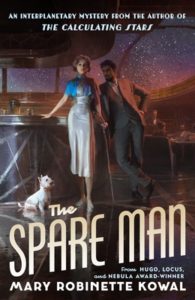
After my experience with The Calculating Stars and The Relentless Moon, I’m always intrigued by a new release from Mary Robinette Kowal. But The Spare Man came out at a time when I was feeling a little burned out on murder mysteries, and after seeing a few mixed reviews, I decided I’d let this one pass me by. Fast forward a year and it became a finalist for the Hugo Award for Best Novel, so it was time to go back and see what I missed.
The Spare Man is a murder mystery on an interplanetary cruise ship. Powerful heiress Tesla Crane is trying to enjoy her honeymoon traveling incognito with her retired detective spouse when they stumble upon a body. When her spouse is arrested for the crime, Tesla takes it upon herself to gather clues and piece together the real story before anyone else is killed.
The Spare Man is inspired by the classic American film The Thin Man, which I have not seen and which isn’t necessary for enjoyment of the story. As far as I know, it doesn’t borrow particular story beats so much as the setup of a retired detective and his wealthy spouse gallivanting about solving crimes while imbibing mass quantities of alcohol. And yeah, that fits—there’s even a cocktail recipe at the beginning of every chapter (many classics, and a couple intriguing originals).
Within that general setup, there are a few ways in which Kowal adds her own contemporary spin. Obviously, there’s the sci-fi setting, with careful attention to the relative gravities and Coriolis effect on various decks of the ship. Then there are changes in social norms regarding gender, with terms like “husband” and “wife” retired in favor of “spouse,” and with the listing of pronouns a standard part of every introduction–not that the new gender norms prevent the lead from facing sexism at seemingly every turn. The rich protagonist throwing her money and influence around is necessary for the sake of the plot (otherwise, she’d just let the shipboard police force do their jobs), but it’s lampshaded by her spouse and lawyer constantly reminding her not to abuse her privilege, creating a little distance between the reader and the lead while preserving the mystery plot.
Finally, and most intriguing to me, was the portrayal of disability. This is my third Kowal novel, and every single one featured a lead suffering some sort of invisible ailment. In this, Tesla is an engineer with severe PTSD that can surface both via environmental factors and actions that remind her of the accident—specifically, hands-on engineering work. A device that dulls the nerves allows her to skirt some of the chronic pain, and a support dog is used as a plot device as often as for actual support, but the moments of fighting off the panic when trying to solve tech problems are some of the more compelling of the book.
That’s a very long preamble explaining ways in which this differs from a standard mystery novel. But how does it fare as a mystery novel? Unlike most sci-fi/fantasy mysteries I read, which tend to feel like adventures with a dead body at the beginning, this really does come off as a mystery novel. There are plenty of clues and plenty of suspects, and Kowal’s writing keeps the story moving along quickly and makes it easy to engage. I know prose can be idiosyncratic, but I almost always find it very easy to immerse in her work, and this one was no different. And, as a cocktail aficionado, I thought Tesla’s struggle to get fresh lime juice in a margarita at a pool bar was a particularly nice touch.
But what makes or breaks a murder mystery is the ultimate revelation of who actually committed the crime. The most successful stories simultaneously give the reader the feeling that the murderer was the only possible option that fit all the clues, while at the same time the feeling that they never would’ve figured it out on their own. And in this respect, The Spare Man falls short. The conclusion is relatively satisfying, but the final explanation produces a key clue that had not been shared previously (unless I’m failing to remember, which is possible, though I have tried to double-check), inhibiting that “of course that’s the only way it could’ve been” feeling.
Overall, it’s a pretty quick and fun read. Kowal writes in a way that I find especially engaging, and the fast-paced plot that goes from body to near-miss to body—with a few cocktails thrown in between—prevents much in the way of lulls. But at the same time, it doesn’t come together quite as well as some of the Lady Astronaut books. The world doesn’t feel as rich and full as the alternate history of her previous series, especially with the gender norms having seemingly changed so much and simultaneously so little, and the dramatic reveal at the end is relatively satisfying but doesn’t elevate the story in the way you’d hope in a murder mystery. It’s a good read, but it certainly isn’t the first I’d recommend from the author.
Recommended if you like: lightweight murder mysteries, Kowal’s style.
Can I use it for Bingo? If you count the engineering and not the heiress(ing), it would be hard mode for Mundane Jobs, and it’s also a Book Club book that Features Robots and a Queernorm Setting.
Overall rating: 15 of Tar Vol’s 20. Four stars on Goodreads.
